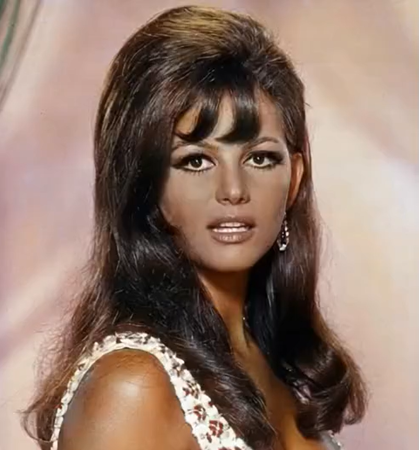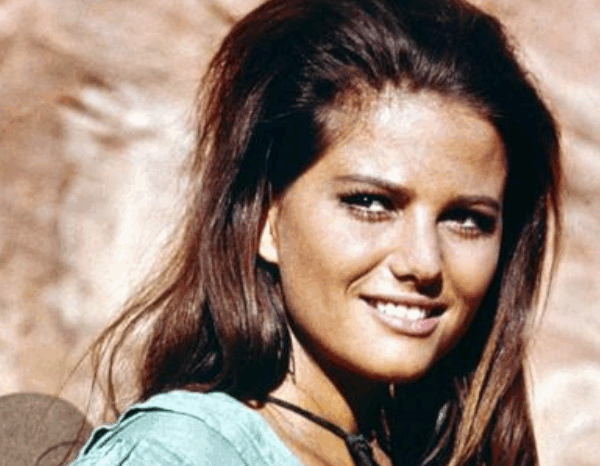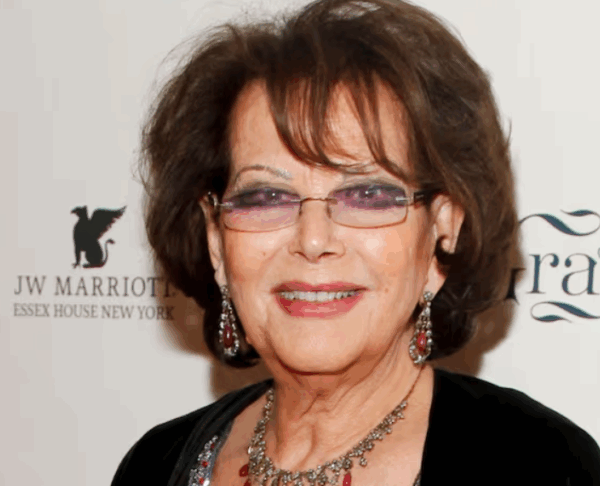
She rose to fame during the golden age of cinema, capturing the hearts of audiences around the world with a magnetic presence that seemed to radiate from the screen.
Claudia Cardinale was not only admired for her beauty but for the intelligence, warmth, and emotional depth she brought to every performance.
From her earliest appearances in film, it was evident that she possessed a rare combination of grace, charisma, and skill that set her apart from her peers.
Her performances were more than acting—they were nuanced explorations of complex, multi-dimensional characters, each portrayed with sensitivity, passion, and authenticity that made them resonate with audiences across generations.
Whether in dramatic roles, romantic comedies, or epic historical films, Cardinale had an uncanny ability to breathe life into every character she embodied, leaving an indelible mark on viewers and critics alike.
Born in Tunisia in 1938 to Sicilian parents, Claudia’s journey to cinematic stardom was shaped by both circumstance and determination.
She grew up in a multicultural environment, which fostered an early awareness of different languages, cultures, and perspectives—an awareness that would later enrich her performances on screen.
At the age of 17, she won a beauty contest that launched her into the world of modeling and eventually acting, setting her on a path that would lead to international fame.
Her early work caught the attention of Italian filmmakers, and soon she was cast in roles that showcased not only her striking appearance but also her natural ability to convey complex emotions with subtlety and depth.
Claudia Cardinale’s rise to fame coincided with a pivotal moment in Italian and European cinema. During the 1960s and 1970s, filmmakers were experimenting with new narratives, cinematic techniques, and styles that would redefine the art form.
Cardinale became a key figure in this era, starring in some of the most memorable films of the period.
Her collaborations with legendary directors such as Luchino Visconti, Federico Fellini, and Sergio Leone helped establish her as a central figure in the evolution of modern cinema.

In films such as 8½, The Leopard, and Once Upon a Time in the West, she delivered performances that were lauded for their emotional intensity, complexity, and authenticity, solidifying her reputation as one of the finest actresses of her generation.
Her career was not without challenges. Working in a male-dominated industry, Cardinale often faced expectations and pressures that her male counterparts did not.
She navigated these dynamics with intelligence, poise, and resilience, carefully selecting roles that allowed her to showcase her talent while asserting her individuality.
Critics often noted her ability to convey a spectrum of emotions without overacting, making even the quietest scenes memorable and impactful.
Cardinale’s dedication to her craft earned her respect from directors, co-stars, and audiences alike, and her professionalism became a model for aspiring actors in Italy and beyond.
Beyond her performances, Claudia Cardinale also became a symbol of timeless elegance and sophistication.
Her presence at international film festivals, retrospectives, and public events continued to inspire admiration and respect well into her later years.
She frequently shared insights into her experiences, discussing the evolution of cinema, her approach to acting, and the challenges faced by women in the film industry.
These reflections allowed younger generations of filmmakers and actors to learn from her journey, drawing inspiration from her example of perseverance, dedication, and artistry.
Cardinale’s influence extends far beyond her screen performances. She became an icon of cultural significance, representing not only Italian cinema but also the broader potential of women in film.
Her career demonstrates that true artistry requires both skill and resilience, showing that actresses can leave lasting legacies while navigating the pressures of fame, societal expectations, and the complexities of personal life.
Many young actors and filmmakers cite her as a role model, inspired by the way she balanced professionalism with authenticity, and glamour with depth.

Throughout her career, Claudia Cardinale maintained a unique balance between her public image and private life. Despite living much of her life in the public eye, she remained grounded, focusing on her craft and her contributions to cinema.
Over the decades, she received numerous awards and accolades, celebrating her work both in Italy and internationally.
These honors, however, only partially reflect the profound impact she has had on cinema and culture;
her true legacy lies in the enduring influence of her performances, the inspiration she provides to new generations, and the way she transformed the perception of women in film.
Even in her later years, Claudia continues to attend film festivals, participate in retrospectives, and engage with filmmakers and fans around the world.
She shares stories from her early career, reflecting on how the film industry has changed over time while emphasizing the importance of passion, perseverance, and authenticity.
Her reflections provide invaluable lessons for those seeking to understand not only cinema but also the power of art to influence culture, emotion, and society.
Claudia Cardinale’s story is not just about a single actress’s success—it is about the transformative power of cinema itself.
Her work bridges the gap between classic and contemporary filmmaking, embodying the essence of storytelling, emotional truth, and the enduring allure of a true screen icon.
She has inspired countless actors, filmmakers, and audiences, demonstrating that talent, resilience, and dedication can create a body of work that transcends time and cultural boundaries.
In essence, Claudia Cardinale stands as a living testament to the beauty and power of film.
Her journey reflects the struggles and triumphs of an artist dedicated to her craft, and her legacy reminds the world that cinema is more than entertainment—it is a reflection of humanity, culture, and creativity.
As both a symbol of Italian cinematic heritage and a global screen icon, Claudia Cardinale continues to captivate hearts, inspire artists, and remind audiences everywhere that the magic of true talent is timeless.
Her life and career are enduring evidence that elegance, artistry, and passion can leave an impact that resonates far beyond the silver screen.
She rose to fame during the golden age of cinema, capturing the hearts of audiences around the world with a magnetic presence that seemed to radiate from the screen.
Claudia Cardinale was not only admired for her beauty but for the intelligence, warmth, and emotional depth she brought to every performance.
From her earliest appearances in film, it was evident that she possessed a rare combination of grace, charisma, and skill that set her apart from her peers.
Her performances were more than acting—they were nuanced explorations of complex, multi-dimensional characters, each portrayed with sensitivity, passion, and authenticity that made them resonate with audiences across generations.
Whether in dramatic roles, romantic comedies, or epic historical films, Cardinale had an uncanny ability to breathe life into every character she embodied, leaving an indelible mark on viewers and critics alike.
Born in Tunisia in 1938 to Sicilian parents, Claudia’s journey to cinematic stardom was shaped by both circumstance and determination.
She grew up in a multicultural environment, which fostered an early awareness of different languages, cultures, and perspectives—an awareness that would later enrich her performances on screen.
At the age of 17, she won a beauty contest that launched her into the world of modeling and eventually acting, setting her on a path that would lead to international fame.
Her early work caught the attention of Italian filmmakers, and soon she was cast in roles that showcased not only her striking appearance but also her natural ability to convey complex emotions with subtlety and depth.
Claudia Cardinale’s rise to fame coincided with a pivotal moment in Italian and European cinema. During the 1960s and 1970s, filmmakers were experimenting with new narratives, cinematic techniques, and styles that would redefine the art form.
Cardinale became a key figure in this era, starring in some of the most memorable films of the period.
Her collaborations with legendary directors such as Luchino Visconti, Federico Fellini, and Sergio Leone helped establish her as a central figure in the evolution of modern cinema.

In films such as 8½, The Leopard, and Once Upon a Time in the West, she delivered performances that were lauded for their emotional intensity, complexity, and authenticity, solidifying her reputation as one of the finest actresses of her generation.
Her career was not without challenges. Working in a male-dominated industry, Cardinale often faced expectations and pressures that her male counterparts did not.
She navigated these dynamics with intelligence, poise, and resilience, carefully selecting roles that allowed her to showcase her talent while asserting her individuality.
Critics often noted her ability to convey a spectrum of emotions without overacting, making even the quietest scenes memorable and impactful.
Cardinale’s dedication to her craft earned her respect from directors, co-stars, and audiences alike, and her professionalism became a model for aspiring actors in Italy and beyond.
Beyond her performances, Claudia Cardinale also became a symbol of timeless elegance and sophistication.
Her presence at international film festivals, retrospectives, and public events continued to inspire admiration and respect well into her later years.
She frequently shared insights into her experiences, discussing the evolution of cinema, her approach to acting, and the challenges faced by women in the film industry.
These reflections allowed younger generations of filmmakers and actors to learn from her journey, drawing inspiration from her example of perseverance, dedication, and artistry.
Cardinale’s influence extends far beyond her screen performances. She became an icon of cultural significance, representing not only Italian cinema but also the broader potential of women in film.
Her career demonstrates that true artistry requires both skill and resilience, showing that actresses can leave lasting legacies while navigating the pressures of fame, societal expectations, and the complexities of personal life.
Many young actors and filmmakers cite her as a role model, inspired by the way she balanced professionalism with authenticity, and glamour with depth.

Throughout her career, Claudia Cardinale maintained a unique balance between her public image and private life. Despite living much of her life in the public eye, she remained grounded, focusing on her craft and her contributions to cinema.
Over the decades, she received numerous awards and accolades, celebrating her work both in Italy and internationally.
These honors, however, only partially reflect the profound impact she has had on cinema and culture;
her true legacy lies in the enduring influence of her performances, the inspiration she provides to new generations, and the way she transformed the perception of women in film.
Even in her later years, Claudia continues to attend film festivals, participate in retrospectives, and engage with filmmakers and fans around the world.
She shares stories from her early career, reflecting on how the film industry has changed over time while emphasizing the importance of passion, perseverance, and authenticity.
Her reflections provide invaluable lessons for those seeking to understand not only cinema but also the power of art to influence culture, emotion, and society.
Claudia Cardinale’s story is not just about a single actress’s success—it is about the transformative power of cinema itself.
Her work bridges the gap between classic and contemporary filmmaking, embodying the essence of storytelling, emotional truth, and the enduring allure of a true screen icon.
She has inspired countless actors, filmmakers, and audiences, demonstrating that talent, resilience, and dedication can create a body of work that transcends time and cultural boundaries.
In essence, Claudia Cardinale stands as a living testament to the beauty and power of film.
Her journey reflects the struggles and triumphs of an artist dedicated to her craft, and her legacy reminds the world that cinema is more than entertainment—it is a reflection of humanity, culture, and creativity.
As both a symbol of Italian cinematic heritage and a global screen icon, Claudia Cardinale continues to captivate hearts, inspire artists, and remind audiences everywhere that the magic of true talent is timeless.
Her life and career are enduring evidence that elegance, artistry, and passion can leave an impact that resonates far beyond the silver screen.


